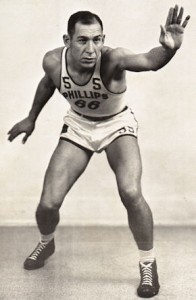Press Release-
Ada, OK – While the late Jim Thorpe is a household name in Oklahoma, the second Native American from Oklahoma to win Olympic gold is not nearly as well known. But that will change to some degree when the late Jesse “Cab” Renick is inducted into the Oklahoma Sports Hall of Fame by the Jim Thorpe Association August 6.
 Renick, a Chickasaw and Choctaw who got his start in basketball on a dirt court in Marietta, Okla., led the 1948 U.S. Olympic basketball team to a gold medal.
Renick, a Chickasaw and Choctaw who got his start in basketball on a dirt court in Marietta, Okla., led the 1948 U.S. Olympic basketball team to a gold medal.
The 1948 team was known as a team of diversity, with players representing different ages and races from many different areas of the country. Another Oklahoman, Bob Kurland, from Bartlesville, was also on the team. Kurland, one of basketball’s first great seven-footers, led Oklahoma A & M to two consecutive NCAA Championships in 1945 and 1946.
“It is significant that Cab Renick won an Olympic gold medal as captain of the team,” said Bill Anoatubby, Governor of the Chickasaw Nation. “He was not only a great basketball player known for his energy and enthusiasm; he was a leader on the court. He had a unique ability to unite team members of diverse backgrounds.”
As comparisons abound between the 2012 Olympic Basketball Team and the 1992 Olympic Basketball “Dream Team,” the 1948 U.S. Olympic team that dominated the basketball competition in London is also gaining some recognition 64-years after the fact.
As captain of the squad, Renick led the 1948 team to eight consecutive wins with an average margin of victory of more than 33 points per game.
Most of the players on the U.S. Olympic team 64 years ago were recruited from the Amateur Athletic Union or university squads.
Professional athletes were not permitted in Olympic competition at the time, and professional basketball was in its infancy.
As the Olympic Games got underway, the U.S. team won virtually every game handily. The only exception came in the preliminaries with a narrow 59 to 57 defeat of Argentina.
The margin in other games ranged from 25 points to 65 points.
In eight games that Olympic year, the U.S. scored a total of 524 points while their opponents scored a total of 256 points.
After the games, Renick returned to Oklahoma where he coached four years with the Phillips 66ers – an American Athletic Union team – for four years, winning one National Championship in 1949-50 as a coach. The AAU was pre-NBA where teams competed for national championships. In fact, before being named to the Olympic team, Renick played for the 66ers who won AAU National Championships in 1945-48.
After his start on a dirt basketball court in Marietta, he honed his court skills until his graduation from high school in 1934. He wanted to continue playing basketball, but no college was interested at the time.
With the country mired in the Great Depression, Renick joined the Civil Conservation Corps and helped construct buildings at Lake Murray State Park. That job also gave him the opportunity to play basketball for the Corps team where he was known as “Point a Minute” Renick.
He was soon recruited by Murray State College, where he played from 1936-38. Oklahoma A&M (now Oklahoma State University) coach Henry Iba heard about Renick and invited him to play for his team. After the first game, Renick was a starter for Oklahoma A&M for the rest of his college career. He played in the 1938-39 season in the new basketball arena now known as Gallagher-Iba Arena.
Throughout his time at the university, Renick was a crowd favorite. According to a press release at the time from Oklahoma A&M, Renick:
“…seemingly performs the work of two players. After he snares the ball off the defensive blackboard, tosses it to a teammate, races ahead down the floor to post position; and, after his club brings the ball up the court, receives a pass for a lay-up and two points.”
But it was his experience in London in 1948 that kept people coming to ask about what it was like to compete in the Olympics. In his later years, and living at the Veterans Center in Ardmore, he would keep his Gold Medal in a pouch secured to his wheelchair and would ask people to hold out their hand. When they did, he would plop the medal in their hand and smile because he knew they would ask about it and he could tell them the story of the 1948 Olympic dream team.
Renick was elected to the American Indian Athletic Hall of Fame in 1973 and the Chickasaw Hall of Fame in 1996. He died on Nov. 29, 1999.
Watch OSU Hall of Fame video about Jesse Renick: